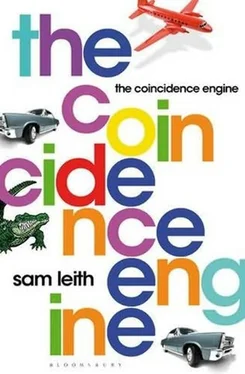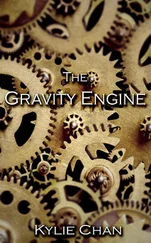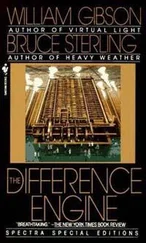‘I’m sure,’ said Sherman. The slip road rose in a gentle left-hand curve from ground level up and over the southbound carriageway of the 285 before cresting and then sloping down to join the fat interstate heading west. The silver car disappeared round the curve ahead of them, and as they coasted over the top of the rise and faced down, they were momentarily dazzled by the sun.
The silver car must have already joined the main road. Cars were shuffling between lanes just off the slipway. The I-20 ribboned off towards the horizon, and as far as Sherman and Davidoff could see – three lanes of faded blacktop – the roofs of cars reflected the sun’s coppery light like the scales of a snake. It was beautiful, all those cars crawling westwards together.
Every car for as far as the eye could make out was silver. Every one – Sherman knew at that moment in his guts – was a Pontiac.
‘Let’s go back to the motel,’ he said. ‘We may have to think again.’
Davidoff steered them off at the next exit and they looped back round towards Atlanta, Sherman dialling Ellis’s number, letting his thumb hover over the green button to call, and then thinking better of it.
There did seem to be an awful lot of silver cars on the road, Alex thought as he drove out of the city. Odd. Perhaps there was a factory nearby.
Then he was back into his thoughts. Those thoughts. They seemed less pernicious, less circular, less – if he was honest about it – thinky than the thoughts he had been having beforehand. Always nearer by not keeping still. Now he was moving and his thoughts were calm to the point of being almost contentless.
He was even able to avoid thinking about some of the things he usually found himself thinking about. He had decided not to think about the effect on his credit card of hiring a car for two weeks, and lo and behold, here he was, not thinking about it. He had decided not to think about the likelihood that he’d fail to finish his PhD, lose his funding and have to move back in with his mum, and lo and behold, here he was not thinking about it. He had decided not to – well, he was really not thinking about that. He ran through a whole list of the things he wasn’t thinking about – some more quickly than others, and none of them bit him.
‘I might take up not thinking for good,’ he said aloud to himself – something he realised he had started to do over the last couple of days. Not thinking was working splendidly. He knew from the atlas on the passenger seat that he was headed for the west, and that it would take him a few days to get there. All he knew was that the next big town was Birmingham. That was fine.
He weaved past another of those silver cars. They seemed to be thinning out. This was much better, he decided, than driving in the UK. Once you got the hang of driving on the right, obviously. No roundabouts. No changing gear. As a teenager, Alex had driven into the back of a stationary Volvo as a consequence of a misunderstanding that had involved both roundabouts and changing gear.
Now, here, this was very satisfactory. No roundabouts, no gearstick – no corners, practically. The highway was dead straight, and cool air from the air con blew onto his arms.
The car had a docking station for his iPod. Letting his eyes leave the road in brief guilty bursts, he put on the Talking Heads. ‘Things fall apart,’ David Byrne announced to the car. ‘It’s scientific!’
Alex sang along with ‘Road to Nowhere’, and then ‘Psycho Killer’, and just as his own jollity started to sound forced to him, ‘Once in a Lifetime’ came on and his mood turned.
It was a song about a man waking up to find himself in and out of time… Then a rushing chorus, something about water rushing over and under and everywhere. Was it a song about drowning? If so, it was a very exultant one. Alex felt uplifted and estranged. Nobody was with him. He realised he didn’t know, again, whether he was happy or sad. The music decided for him.
When he’d been a child, sitting in the back of the car, the music on the radio had been the soundtrack to his life. He’d watched fence posts, pylons, stanchions tick past – slowly up ahead, then too fast to see when you looked at them right at the side of the car, then slowlier behind. He had sat, entirely absorbed in himself – or, rather, himself entirely absorbed in what was around him. Watching the English countryside roll by. On the long journeys from Cambridge down to their Cornish holidays in summer: red clay churned in fields to each side. This was where his mother was from. Eurythmics. His father taking him to boarding school. Springsteen. Coming back late at night, sleepy, from the airport when they’d taken their first holiday to Corsica. He must have been ten, then. Tom Waits singing about an ‘old ’55’.
Alex started experimenting with the cruise control button. If you pressed it, the car kept to its speed. You could put your feet on the floor – even dare yourself, just momentarily, to take your hands off the wheel until the car, very gently, started to slide towards the lane markers at the edge of the road and you grabbed the wheel again, just between finger and thumb.
He remembered hearing about ‘cruise control’ as a child, and imagining it at first to be something they had in America where the car drives itself. Someone later had told him a story of how someone had put on cruise control on a long desert highway and fallen asleep. A very slight bias on the steering – no more than a fraction of a degree – had caused the car to wander off the road and out into the flat scrub desert. The man had woken up maybe half an hour after the the car had coughed its last of petrol and rolled to a halt. There had been no sign of a road or a river or another human being in any direction: just level low scrub, and dry dirt, and behind his car a long and imperceptibly curved pair of tyre tracks in the dust, slowly being erased by the evening wind. Nobody had come to get him. He had died there.
This story had stayed with Alex. What looks like a straight line turns out to be a curve. A tiny fraction of error could scale; a trivial multiplier could propagate into a cascade. A fragment of a degree in the angle of approach was the difference between a stable orbit and slingshotting into deep space; a fraction of a second’s lag in a clock could make a GPS system put an aeroplane into a mountain. The curvature of a miniscus could scatter light, or focus it to a point.
When Alex had been travelling in his gap year, he’d gone to Tibet. He’d left Lhasa on a local bus bound across the Himalayas for Kathmandu, him and his big brother – then on his summer holidays from university. It had taken a couple of days, rattling over the passes where the air was thin and the sky was blue-white. The high points in the passes were marked with cairns of stones, and bleached prayer flags, muddy snow in pockets of the ground.
When they stopped to get out at one place to take photographs, Alex remembered thinking how you could plot lines radiating out from his position there by the bus. At any moment, to move along one of those lines in one of those directions would be to die. He was entirely safe in the bus – but walk thirty feet to the left and you’d tumble down a steep bank of scree. Set off to the right, let the bus leave you behind, you’d be dead of exposure in forty-eight hours, maybe.
You could do that at any time, anywhere. You were almost never more than a strange decision or an accident, or a movement of a few feet, from extinction. Alex had started to imagine himself as the centre of a spiderweb of lines, constantly adjusting, on the map. At the end of each one a black X. As you walked beside a busy road, on the road side of you the lines would be compressed to no more than a couple of metres – to the other side they’d extend hundreds of metres, maybe. Stand on the edge of a cliff and the lines would fan out from your feet all along the clifftop – and the same would be true of every other human being. Everyone would carry their own invisible, unmonitored, 360-degree asterisk of harm.
Читать дальше












